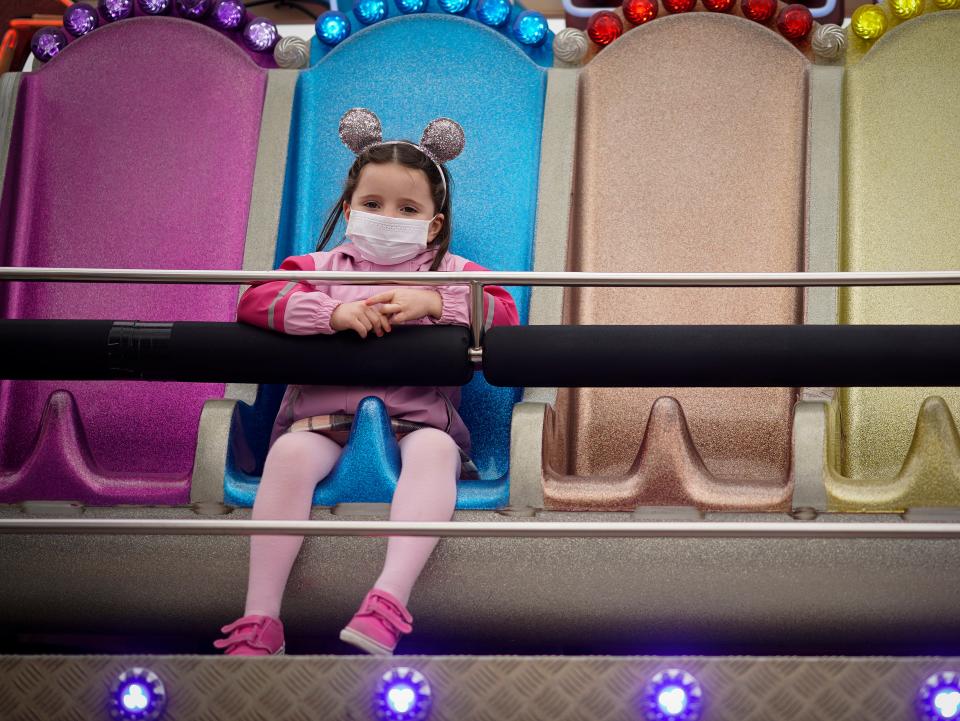Scientists and campaigners call for more research into long Covid in children

A young girl wearing a mask at a Blackpool fairground
(Getty)Scientists and campaign groups have called for more research into long Covid in children, as uncertainty surrounding the phenomenon continues to grow.
The latest data from the Office for National Statistics suggest that 13 per cent of under-11s and nearly 15 per cent of 12- to 16-year-olds are reporting at least one symptom five weeks after being infected with Covid-19.
The estimates are drawn from 9,063 respondents of all ages who tested positive for the virus up to 14 December and are being assessed on a weekly basis by the ONS.
Separate research published by Italian scientists late last year showed there was emerging evidence to suggest coronavirus can have a long-term impact on children.
A total of 129 children diagnosed with Covid-19 between March and November 2020 were enrolled in the study. More than half reported at least one symptom persisting 120 days after infection, including fatigue, muscle pain and headaches.
In rare cases, children with the virus have also been reported to develop systemic illnesses, including multisystem inflammatory syndrome (MIS).
Many parts of the body, including the heart, lungs and skin, become inflamed, typically following mild Covid-19. While death is uncommon, about 70 per cent of children suffering from MIS may require intensive care.
Long Covid Kids, a campaign group of 1,400 parents with children suffering from the condition, said more needed to be done to investigate the phenomenon and ensure the necessary support is provided for those affected.
Co-founder Frances Simpson, a lecturer in psychology and counselling at Coventry University, said the group was uncovering “horrific” cases of long Covid within its 1,700-strong community of children.
“We’ve found children with a whole range of symptoms, from straight-forward post-viral fatigue to all of the bizarre, frightening symptoms,” she told The Independent. “We’ve done a couple of surveys. The first one we gave 50 symptoms for parents to choose from, but they ended up listing 100 symptoms.
“We’re seeing profiles of different things that relate to similarities to PMIS [paediatric multisystem inflammatory syndrome]. We’re seeing neuropsychiatric symptoms, so children who are developing ticks, stutters and huge mood changes that go with that. Children with seizures.
“What we’re seeing and experiencing is appalling. We need more research into this.”
Compared to the first wave of the pandemic, Ms Simpson said her campaign group was seeing an increasing number of children who are struggling to recover from long Covid. “But we’ve got kids who were infected from last February right through to now,” she said, adding that it can often take weeks for long-lasting symptoms to materialise.
Experts have said that more data is needed to draw any firm conclusions, with the recent Italian study criticised for not being large enough. The ONS results also lacks a comparator group, meaning its findings are not entirely reliable.
Sir Terence Stephenson, a Nuffield professor of child health at University College London, has meanwhile been awarded £1.3m to lead a study investigating long Covid in 11- to 17-year-olds.
The research will assess risk factors, prevalence and how long symptoms persist. “There’s hardly any evidence or data from around the whole world about long Covid in children and young people, and that’s why it’s vital that we do this research now,” Sir Terence said. Preliminary results are expected in three months.
Martin McKee, a professor of European public health at the London School of Hygiene and Tropical Medicine and member of Independent Sage, said more research was “definitely” needed.
“We really do need to understand what is going on,” he told The Independent. “There are enough credible accounts of children who are suffering from symptoms that are going on for months and months. We need to get that information as it’s not completely clear what’s happening.”
He pointed to the example of Israel, where reports have emerged of a steep rise in children testing positive for coronavirus and developing symptoms. Dr Uri Pollak, director of the paediatric intensive care unit at Jerusalem’s Hadassah University Hospital, said last month that he was “seeing more children who are very ill, which led us to open a coronavirus-specific paediatric ICU”.
Prof McKee explained that the reopening of society in Israel, which has followed the success of the country’s vaccine rollout, meant there was “a lot more virus circulating” among less-susceptible age groups who are not protected yet.
This has meant cases are likely to have risen in younger people and children, Prof McKee added, some of which have progressed into something more serious.
“We need to be vigilant as we go forward not just to worry about the numbers but to look at what’s going on with children,” he said.
Prof Christina Pagel, a member of Independent Sage and director of clinical operational research at University College London, said long Covid in children appeared to be less common but warned the emerging data should not be ignored, especially as schools prepare to reopen next Monday.
“It shouldn’t be a case of opening or closing, but we need to make sure mitigation measures are in place against aerosol transmission,” said Ms Simpson.
Long Covid SOS, an adult campaign group, said it was time to challenge the “general narrative around children: that they don’t get infected as frequently as adults, don’t suffer so badly, and don’t spread it. The very real issue of long Covid in children must be taken seriously”.
Read More
Free rapid Covid tests for families of school children in England
World yet to see ‘full extent of coronavirus evolutions’, warns leading UK scientist

 Yahoo Finance
Yahoo Finance 